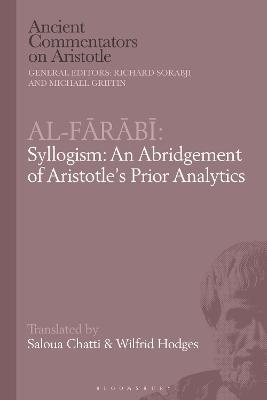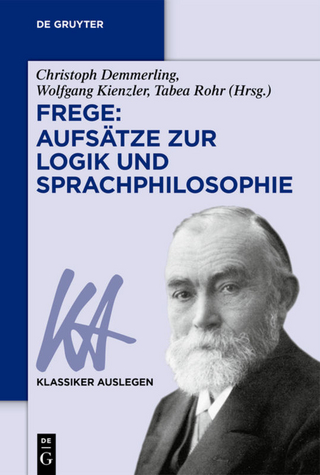
Al-Farabi, Syllogism: An Abridgement of Aristotle’s Prior Analytics
Seiten
2022
Bloomsbury Academic (Verlag)
978-1-350-19489-2 (ISBN)
Bloomsbury Academic (Verlag)
978-1-350-19489-2 (ISBN)
The philosopher Abu Nasr al-Farabi (c. 870-c. 950 CE) is a key Arabic intermediary figure. He knew Aristotle, and in particular Aristotle’s logic, through Greek Neoplatonist interpretations translated into Arabic via Syriac and possibly Persian. For example, he revised a general description of Aristotle’s logic by the 6th century Paul the Persian, and further influenced famous later philosophers and theologians writing in Arabic in the 11th to 12th centuries: Avicenna, Al-Ghazali, Avempace and Averroes. Averroes’ reports on Farabi were subsequently transmitted to the West in Latin translation. This book is an abridgement of Aristotle’s Prior Analytics, rather than a commentary on successive passages. In it Farabi discusses Aristotle’s invention, the syllogism, and aims to codify the deductively valid arguments in all disciplines.
He describes Aristotle’s categorical syllogisms in detail; these are syllogisms with premises such as ‘Every A is a B’ and ‘No A is a B’. He adds a discussion of how categorical syllogisms can codify arguments by induction from known examples or by analogy, and also some kinds of theological argument from perceived facts to conclusions lying beyond perception. He also describes post-Aristotelian hypothetical syllogisms, which draw conclusions from premises such as ‘If P then Q’ and ‘Either P or Q’. His treatment of categorical syllogisms is one of the first to recognise logically productive pairs of premises by using ‘conditions of productivity’, a device that had appeared in the Greek Philoponus in 6th century Alexandria.
He describes Aristotle’s categorical syllogisms in detail; these are syllogisms with premises such as ‘Every A is a B’ and ‘No A is a B’. He adds a discussion of how categorical syllogisms can codify arguments by induction from known examples or by analogy, and also some kinds of theological argument from perceived facts to conclusions lying beyond perception. He also describes post-Aristotelian hypothetical syllogisms, which draw conclusions from premises such as ‘If P then Q’ and ‘Either P or Q’. His treatment of categorical syllogisms is one of the first to recognise logically productive pairs of premises by using ‘conditions of productivity’, a device that had appeared in the Greek Philoponus in 6th century Alexandria.
Saloua Chatti is former Professor of Philosophy at the University of Tunis, Tunisia. Wilfrid Hodges is Emeritus Professor of Mathematics at Queen Mary, University of London, UK.
Preface Richard Sorabji
Conventions
Acknowledgements
Introduction Wilfrid Hodges
1. A Brief Guide to Categorical Syllogisms
2. Al-Farabi and his Writings
3. The Book Syllogism
Textual Emendations
Translation
Notes
Bibliography
English-Arabic-Greek Glossary
Arabic-English Index
Index of Passages from Aristotle
Subject Index
| Erscheinungsdatum | 06.04.2022 |
|---|---|
| Reihe/Serie | Ancient Commentators on Aristotle |
| Verlagsort | London |
| Sprache | englisch |
| Maße | 156 x 234 mm |
| Themenwelt | Geisteswissenschaften ► Philosophie ► Logik |
| Geisteswissenschaften ► Philosophie ► Metaphysik / Ontologie | |
| Geisteswissenschaften ► Philosophie ► Philosophie Altertum / Antike | |
| ISBN-10 | 1-350-19489-1 / 1350194891 |
| ISBN-13 | 978-1-350-19489-2 / 9781350194892 |
| Zustand | Neuware |
| Informationen gemäß Produktsicherheitsverordnung (GPSR) | |
| Haben Sie eine Frage zum Produkt? |
Mehr entdecken
aus dem Bereich
aus dem Bereich
ein Gegenentwurf zum kurzfristigen Denken : so werden wir zu den …
Buch | Hardcover (2023)
REDLINE (Verlag)
18,00 €


